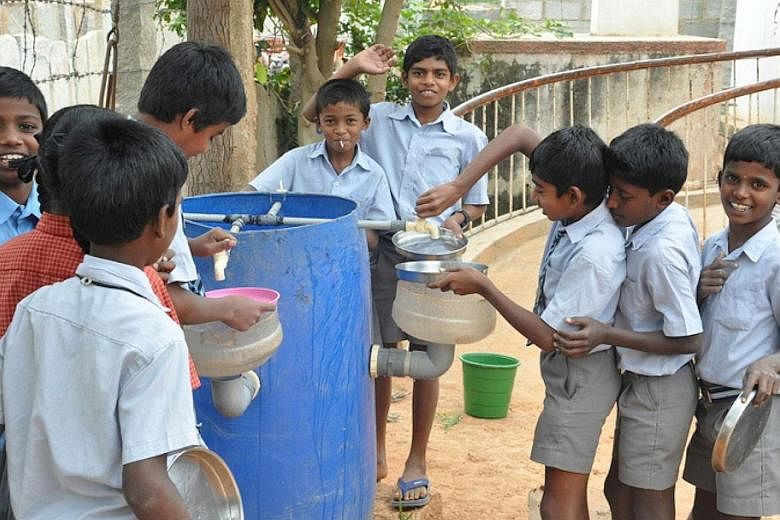BANGALORE • At Reap Benefit's charming office in an old bungalow in Bangalore is a quote by Mozart, written with chalk at the entrance: "Be silent if you choose but when it is necessary, speak - and speak in such a way that people will remember it."
It is an apt model for the environmental work that this quiet Bangalore-based social enterprise has done since 2012, motivating schoolchildren aged 12-17 to initiate innovative, actionable solutions to India's water, sanitation and environmental problems.
Reap Benefit approaches rich private schools and poor government schools, and works with their students year after year to build what they call "an ecosystem of ownership" towards problems.
Solutions aren't cookie-cutter. Students at the Murphy Town government school started a biogas plant, while a brainstorming session with another group of kids led to a low-cost grey-water harvesting device that saves the Muthur government school 60 litres a day. "Human-centred design" is key to this type of solution, according to Mr Kuldeep Dantewadia, 27, Reap Benefit's co-founder. Reap Benefit helps students investigate local problems in the local context and come up with answers. "Each child has a unique way of experiencing the environment," said Mr Gautam Prakash, 30, the other co-founder and hands-on project coordinator who works with students to develop and implement solutions.
Many participating students go on to instigate change at home and in their communities, such as a 9th grade student at DPS Bangalore East School who convinced his parents to install LED lightbulbs, or an 11th grade girl from Sri Kumaran school who organised a clean-up in her neighbourhood after the Diwali (or Deepavali) festival.
The enterprise receives financing from foundations, private schools and the sale of proprietary products such as an organic enzyme that converts waste into compost. Since 2012, Reap Benefit claims to have impacted 11,500 students in 240 schools with more than 500 initiatives, saving 33 tonnes of waste, 19 million litres of water and 1,450 kilowatt hours of electricity.
The organisation gathers both qualitative and quantitative data. For example, it discovered that one reason teenage girls weren't using school toilets was that there were no hooks for them to hang their dupattas (long scarves worn over the chest). It also tracked water use across Bangalore to find out where there was the most waste. In many instances, students collecting the data come up with solutions.
One 14-year-old girl started a change.org petition. Two other girls wanted to track water waste, and Reap Benefit helped them create an algorithm that won them awards at science competitions.
One high-school boy championed the waterless urinal made from discarded PET bottles that Reap Benefit invented with students, campaigning to have them installed in all the government schools in his town.
Hoping to scale up and reach one million young people across the country, Reap Benefit is preparing to launch a free mobile app. It will help users to identify local problems, tackle them with DIY tools, and communicate data and solutions to others.
Reap Benefit works in the belief that India's most pressing problems require human capital - people wanting to tackle everyday issues and capable of coming up with solutions. As Mr Dantewadia likes to say: "We want to make solving big problems child's play."

